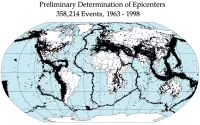Angola is a country located on the western coast of Southern Africa, bordered by Namibia, the Democratic Republic of the Congo, Zambia, and the Atlantic Ocean. It's the second-largest Lusophone nation, with Luanda as its capital and largest city. Angola also possesses the exclave province of Cabinda.
1925: Vernay Expedition
In 1925, American naturalist explorer Arthur Stannard Vernay conducted an expedition to Angola.
1939: Portuguese Army Operations Against the Mucubal
Between 1939 and 1943, the Portuguese army conducted operations against the Mucubal people, whom they accused of rebellion and cattle-thieving, resulting in hundreds of deaths and imprisonments.
1943: Portuguese Army Operations Against the Mucubal Conclude
Between 1939 and 1943, the Portuguese army conducted operations against the Mucubal people, whom they accused of rebellion and cattle-thieving, resulting in hundreds of deaths and imprisonments. The operations concluded in 1943.
1951: Increase in Annual Average Temperature
Due to climate change, Angola's annual average temperature has increased by 1.4°C since 1951, and is expected to keep rising while rainfall is becoming more variable.
October 1961: MPLA Attempts to Create Common Front with FNLA
In October 1961, the MPLA attempted to move its headquarters to Léopoldville and renew efforts to create a common front with the FNLA. However, Holden Roberto rejected the offer and UPA partisans ambushed and annihilated MPLA insurgents.
1961: Rival Nationalist Movements Hampered by Factionalism
Between 1961 and 1975, the three rival nationalist movements (MPLA, UNITA, and FNLA) were severely hampered by political and military factionalism and their inability to unite guerrilla efforts against the Portuguese.
1961: Start of Anti-Colonial Struggle
In 1961, Angola began a protracted anti-colonial struggle against Portugal, which lasted until 1974.
1961: Baixa de Cassanje Revolt and Start of Armed Conflict
In 1961, Portugal's refusal to address Angolan demands for self-determination led to an armed conflict, which began with the Baixa de Cassanje revolt and evolved into a protracted war of independence.
1961: Armed conflict since 1961
Since 1961 Angola experienced almost continual armed conflict.
1961: Expulsion of Protestant missionaries
Since the beginning of the anti-colonial fight in 1961 the Portuguese colonial authorities expelled a series of Protestant missionaries and closed mission stations based on the belief that the missionaries were inciting pro-independence sentiments.
1966: Ovimbundu guerrilla initiative
In 1966, Jonas Savimbi and the National Union for the Total Independence of Angola (UNITA) spearheaded a largely Ovimbundu guerrilla initiative against the Portuguese in central Angola.
1968: Discovery of oil reserves by CABGOC
In 1968, the Cabinda Gulf Oil Company (CABGOC) discovered most of the oil along Cabinda's coast under Portuguese rule.
December 1970: Last Census before 2014
Angola conducted it's first census in 2014 since 15 December 1970.
1972: Release of Sambizanga
In 1972, one of Angola's first feature films, Sarah Maldoror's internationally co-produced Sambizanga, was released at the Carthage Film Festival, winning the Tanit d'Or.
1974: End of Anti-Colonial Struggle
In 1974, the protracted anti-colonial struggle that began in 1961 came to an end.
January 1975: Mombasa Agreement
In early January 1975, Holden Roberto, Jonas Savimbi, and Agostinho Neto met in Mombasa and agreed to form a coalition government, encouraged by the Organisation of African Unity.
March 1975: Violence in Luanda
In March 1975, sporadic violence broke out in Luanda after the FNLA attacked the MPLA's political headquarters.
August 1975: MPLA Requests Assistance from Soviet Union
In August 1975, the MPLA requested direct assistance from the Soviet Union, but the Soviets only offered advisors. Cuba sent combat personnel and equipment in late September.
November 1975: Independence Date Set
The Alvor Agreement ratified in January 1975 set Angola's independence date for 11 November 1975.
1975: Destruction and socio-economic damage since 1975
After the 1975 independence, the highest level of destruction and socio-economic damage took place during the long years of civil war.
1975: Angola gains independence
Before independence in 1975, Angola was a bread-basket of southern Africa and a major exporter of bananas, coffee and sisal, but three decades of civil war destroyed fertile countryside, left it littered with landmines and drove millions into the cities.
1975: Competition for Influence and International Support
Between 1961 and 1975, the MPLA, UNITA, and the FNLA competed for influence in the Angolan population and the international community. The Soviet Union and Cuba became sympathetic towards the MPLA and supplied that party with resources.
1975: Implementation of Scientific Socialism
Between 1975 and 1991, the MPLA implemented an economic and political system based on scientific socialism, incorporating central planning and a Marxist–Leninist one-party state.
1975: Missionaries activities before independence
Foreign missionaries were very active prior to independence in 1975.
1975: Angola Achieves Independence and Civil War Begins
In 1975, Angola achieved independence as a one-party republic. However, the same year, the country descended into a devastating civil war involving multiple factions, including the MPLA, UNITA, FNLA, and the Front for the Liberation of the Enclave of Cabinda.
1975: Portuguese community dwindles after independence
Prior to independence in 1975, Angola had a community of approximately 350,000 Portuguese, but the vast majority left after independence and the ensuing civil war.
1975: Start of the Angolan Civil War
The Angolan Civil War began in 1975 and lasted until 2002, during which nearly half of all schools were reportedly looted and destroyed.
1977: Attempted Coup and Political Purges
In 1977, the ruling party survived an attempted coup d'état by the Maoist-oriented Communist Organisation of Angola (OCA), which was suppressed after a series of bloody political purges.
1990: Forest Cover
In 1990, Angola's forest cover was around 79,262,780 hectares (ha).
1990: MPLA Abandons Marxism
In 1990, the MPLA abandoned its former Marxist ideology at its third party congress and declared social democracy to be its new platform.
May 1991: Bicesse Accords
In May 1991, the MPLA reached a peace agreement with UNITA, the Bicesse Accords, scheduling new general elections for September 1992.
1991: End of Scientific Socialism Implementation
Between 1975 and 1991, the MPLA implemented an economic and political system based on scientific socialism, incorporating central planning and a Marxist–Leninist one-party state. The implementation ended in 1991.
September 1992: General Elections and UNITA Objections
In September 1992, general elections were held in Angola. When the MPLA secured a major electoral victory, UNITA objected to the results and returned to war.
1995: Cabinda population estimate
According to a 1995 census, Cabinda had an estimated population of 600,000, approximately 400,000 of whom were citizens of neighboring countries.
1995: School Attendance Rate
In 1995, 71.2 percent of children ages 7 to 14 years were attending school in Angola, reflecting attendance disparities between rural and urban areas.
1997: Open Society Foundations launches activities in Angola
In 1997, George Soros's Open Society Foundations launched its activities in Angola with the help of its first national representative until 2004, Rafael Marques de Morais.
1998: Net Primary Enrollment Rate
In 1998, Angola's net primary enrollment rate was 61 percent, based on the most recent data available, and reflecting the number of pupils formally registered in primary school.
1999: Gross Primary Enrollment Rate
In 1999, Angola's gross primary enrollment rate was 74 percent, reflecting the number of pupils formally registered in primary school.
2001: Literacy Rates by Gender
As of 2001, 82.9% of men and 54.2% of women were literate in Angola.
2001: Child mortality rate at 25 percent
In 2001, the child mortality rate in Angola was 25 percent. However, at the same time the social and economic inequality that has characterised the country for so long has not diminished, but has deepened in all respects.
2001: Angola's average GDP growth rate between 2001 and 2010
In the period 2001–10, Angola had the world's highest annual average GDP growth, at 11.1%.
February 2002: Death of Savimbi
On 22 February 2002, government troops killed Savimbi in a skirmish in the Moxico province.
2002: Recovery of agriculture after the Angolan Civil War
After 2002, smallholder and plantation agriculture in Angola began to recover following the Angolan Civil War.
2002: Angola demands compensation from Chevron
In 2002, Angola demanded compensation from Chevron Corporation for oil spills, marking the first time it had fined a multinational corporation operating in its waters.
2002: Angola's life expectancy at 46 years
In 2002, Angola's life expectancy was just 46 years, but the standard of living has greatly improved since then due to investments made possible by funds from the country's development of oil resources.
2002: End of the Civil War
In 2002, the Angolan Civil War ended, and Angola emerged as a relatively stable constitutional republic with one of the fastest-growing economies in the world.
2002: Missionaries return after civil war
Missionaries have been able to return to the country since the early 1990s, although security conditions due to the civil war have prevented them until 2002 from restoring many of their former inland mission stations.
2002: Political stability in 2002
Since Angola achieved political stability in 2002, mainly due to fast-rising earnings in the oil sector, Angola faces huge social and economic problems.
2002: Resettlement of displaced persons after the 2002 peace settlement
The security brought about by the 2002 peace settlement has allowed the resettlement of 4 million displaced persons and a resulting large-scale increase in agricultural production.
2003: Manifesto for New Democracy
In 2011, after Malakito's release from prison, a hardline faction led by José Mateus "Zeca Mutchima" split from the CMJSPLT, forming the Movement of the Portuguese Protectorate of Lunda Chokwe (MPPLT), whose statement of principles was partly drawn from Diogo Pacheco de Amorim's 2003 manifesto for the Portuguese right-wing party New Democracy.
2003: Congolese migrants expelled from Angola
Since 2003, more than 400,000 Congolese migrants have been expelled from Angola.
2004: Increased Budgetary Allocations for Education
Although budgetary allocations for education were increased in 2004, the education system in Angola continued to be extremely under-funded.
2004: End of Rafael Marques de Morais Tenure
In 1997, George Soros's Open Society Foundations launched its activities in Angola with the help of its first national representative, Rafael Marques de Morais, until 2004.
2005: Angola's GDP growth in 2005
In 2005, Angola experienced rapid economic growth, with an average GDP growth of 20% between 2005 and 2007.
2005: Loan from China International Fund Ltd
In 2005, Angola received a loan of $2.9 billion from China International Fund Ltd.
2005: Teacher Recruitment and Training
In 2005, the Ministry of Education in Angola recruited 20,000 new teachers and continued to implement teacher training programs.
2005: Oil production surpasses 1.4 million barrels per day
In late 2005, oil production in Angola surpassed 1.4 million barrels per day and was expected to grow to 2 million barrels per day by 2007.
2006: Angola Qualified for FIFA World Cup
In 2006, the Angola national football team qualified for the FIFA World Cup for the first time.
2006: Angola's economy growth in 2006
In 2006, the Angolan economy grew 26%.
2007: Niacin status in Angola
A 2007 survey concluded that low and deficient niacin status was common in Angola. Demographic and Health Surveys is currently conducting several surveys in Angola on malaria, domestic violence and more.
2007: Government accounts lose US$32 billion
According to a Human Rights Watch report, US$32 billion disappeared from government accounts in 2007–2010.
2007: Angola's ranking on the 2007 Index of African Governance
Angola ranked forty-two of forty-eight sub-Saharan African states on the 2007 Index of African Governance list.
2007: Angola's GDP growth in 2007
In 2007, Angola experienced rapid economic growth, with an average GDP growth of 20% between 2005 and 2007.
2007: Separatist Movement Launched
In 2007, a separatist movement was launched in the diamond-rich Lunda Norte Province by Jota Filipe Malakito, under the name of the Commission of the Legal-Sociological Manifesto of the Lunda Tchokwé Protectorate (CMJSPLT).
2007: Expected oil production growth
In 2007, it was expected that Angola's oil production would grow to 2 million barrels per day.
2007: Refugees and asylum seekers in Angola
It is estimated that by the end of 2007, Angola was host to 12,100 refugees and 2,900 asylum seekers.
June 2008: Institutionalization of the Constitutional Court
On 25 June 2008, the Constitutional Court was institutionalised, and its Judicial Counselors assumed their positions before the President of the Republic.
September 2008: Validation of political party candidacies
In September 2008, the Constitutional Court's first task was the validation of the candidacies of the political parties to the legislative elections of 5 September 2008.
2008: Poverty rates in rural and urban areas in 2008
A study carried out in 2008 found that in rural areas roughly 58% must be classified as "poor" according to UN norms but in the urban areas only 19%, and an overall rate of 37%.
2008: Estimated Muslim population
As of 2008 the U.S. Department of State estimates the Muslim population at 80,000–90,000, less than 1% of the population, while the Islamic Community of Angola puts the figure closer to 500,000.
2008: Migrant workers and residents in Angola
As of 2008, there were an estimated 400,000 Democratic Republic of the Congo migrant workers, at least 220,000 Portuguese, and about 259,000 Chinese living in Angola.
2008: Diamonds and oil make up 60% of Angola's economy
In 2008, it was reported that diamonds and oil make up 60% of Angola's economy, almost all of the country's revenue and all of its dominant exports.
2008: Voter turnout in 2008
The voter turnout in 2008 was 80%.
2008: Elections in Angola
With the elections in 2008 and 2012, an MPLA-ruled dominant-party system emerged, with UNITA and the FNLA as opposition parties.
2009: Economic contraction in 2009
Due to the global recession, the Angolan economy contracted by an estimated −0.3% in 2009.
2010: Government accounts lose US$32 billion
According to a Human Rights Watch report, US$32 billion disappeared from government accounts in 2007–2010.
2010: Child mortality rate falls to 19 percent
By 2010, the child mortality rate in Angola had fallen to 19 percent, and the number of students enrolled in primary school has tripled since 2001. However, at the same time the social and economic inequality that has characterised the country for so long has not diminished, but has deepened in all respects.
2010: New constitution adopted in 2010
In 2010, a new constitution was adopted in Angola, eliminating presidential elections and establishing a system where the president and vice-president are determined by the winning party in parliamentary elections. This resulted in a government classified as an authoritarian regime.
2010: Start of Angolan Media Libraries Network Construction
In 2010, the Angolan government started building the Angolan Media Libraries Network to facilitate access to information and knowledge.
2010: Constitution of 2010
In 2010, the Constitution of Angola established the structure of government and the rights and duties of citizens.
2011: Adult Literacy Rate
According to estimates by the UNESCO Institute for Statistics, the adult literacy rate in Angola was 70.4% in 2011.
2011: Life expectancy reaches 51 years
By 2011, Angola's life expectancy had risen to 51 years, mortality rates for children fell from 25 per cent in 2001 to 19 per cent in 2010 and the number of students enrolled in primary school has tripled since 2001.
2011: Split in the CMJSPLT
In 2011, after Malakito's release from prison, a hardline faction led by José Mateus "Zeca Mutchima" split from the CMJSPLT, forming the Movement of the Portuguese Protectorate of Lunda Chokwe (MPPLT).
2011: Bilateral trade between China and Angola in 2011
In 2011, bilateral trade between China and Angola reached $27.67 billion, up 11.5% year-on-year. China's imports from Angola, mainly crude oil and diamonds, increased 9.1% to $24.89 billion, while China's exports to Angola, including mechanical and electrical products, machinery parts, and construction materials, surged 38.8%.
2011: Runner-up Finish in African Nations Championship
In 2011, the Angola national football team finished as runner-up in the African Nations Championship.
August 2012: Parliamentary elections flaws in 2012
The August 2012 parliamentary elections in Angola, in which the ruling Popular Movement for the Liberation of Angola won more than 70% of the vote, suffered from serious flaws, including outdated and inaccurate voter rolls.
2012: U.S. Department of State report on human rights abuses
A 2012 report by the U.S. Department of State identified official corruption and impunity, limits on freedoms of assembly, association, speech, and press, and cruel and excessive punishment as the three most important human rights abuses in Angola.
2012: Portuguese as first language study
Although the exact numbers of those fluent in Portuguese or who speak Portuguese as a first language are unknown, a 2012 study mentions that Portuguese is the first language of 39% of the population.
2012: Fertility rate in Angola
As of 2012 estimates, the total fertility rate of Angola is 5.54 children born per woman.
December 2013: Angola's inflation rate in December 2013
In December 2013, Angola's inflation rate was at 7.96%, which contributed to the banking sector's growth trend.
2013: Angola's score on the 2013 Ibrahim Index of African Governance
Angola scored poorly on the 2013 Ibrahim Index of African Governance, ranking 39 out of 52 sub-Saharan African countries, particularly in the areas of participation and human rights, sustainable economic opportunity, and human development.
January 2014: Angola chairs the International Conference for the Great Lakes Region
Since January 2014, the Republic of Angola has been chairing the International Conference for the Great Lakes Region (CIRGL).
September 2014: Creation of the Angolan Institute for Cancer Control (IACC)
In September 2014, the Angolan Institute for Cancer Control (IACC) was created by presidential decree to integrate with the National Health Service in Angola, aiming to improve oncology health and medical care and serve as a reference institution in central and southern Africa.
September 2014: Investment in Computerisation of Classrooms
In September 2014, the Angolan Ministry of Education announced an investment of 16 million Euros in the computerisation of over 300 classrooms across the country, including teacher training to introduce new information technologies in primary schools.
October 2014: Optic fiber underwater cable project announced
In October 2014, the building of an optic fiber underwater cable was announced. This project aims to turn Angola into a continental hub, thus improving Internet connections both nationally and internationally.
October 2014: Angola elected to UN Security Council
On 16 October 2014, Angola was elected for the second time as a non-permanent member of the United Nations Security Council.
December 2014: Capital Market launched in Angola
On 19 December 2014, the Capital Market in Angola was launched. BODIVA (Angola Stock Exchange and Derivatives, in English) was allocated the secondary public debt market.
2014: Language statistics according to census
According to the 2014 census, Portuguese is spoken by 71.1% of Angolans, Umbundu by 23%, Kikongo by 8.2%, Kimbundu by 7.8%, Chokwe by 6.5%, Nyaneka by 3.4%, Ngangela by 3.1%, Fiote by 2.4%, Kwanyama by 2.3%, Muhumbi by 2.1%, Luvale by 1%, and other languages by 4.1%.
2014: Angola's population census
According to the preliminary results of its 2014 census, Angola has a population of 24,383,301 inhabitants, the first census conducted since 1970.
2014: IMF expects robust growth in the non-oil economy
In 2014 the International Monetary Fund (IMF) said Angola's economy is expected to grow by 3.9 per cent, robust growth in the non-oil economy, mainly driven by a very good performance in the agricultural sector, is expected to offset a temporary drop in oil production.
2014: National Measles Vaccination Campaign Launched
In 2014, Angola launched a national campaign to vaccinate every child under ten years old against measles across all 18 provinces, as part of the Strategic Plan for the Elimination of Measles 2014–2020 by the Angolan Ministry of Health. This campaign also included vaccination against polio and vitamin A supplementation.
2014: Resumption of the National Festival of Angolan Culture
In 2014, Angola resumed the National Festival of Angolan Culture after a 25-year break, with the theme "Culture as a Factor of Peace and Development."
2014: Census on Portuguese language use
In 2014, a census carried out by the Instituto Nacional de Estatística in Angola mentions that 71.15% of the nearly 25.8 million inhabitants of Angola (meaning around 18.3 million people) use Portuguese as a first or second language.
2014: New penal code takes effect
In 2014, a new penal code took effect in Angola, which included the classification of money-laundering as a crime.
2014: Freedom House classification of Angola in 2014
In the Freedom in the World 2014 report, Angola was classified as 'not free' by Freedom House.
January 2015: Angola's term on the UN Security Council begins
In January 2015, Angola's term of office began as a non-permanent member of the United Nations Security Council.
March 2015: First Angolan Forum of Telecommunications and Information Technology held
On 11 March 2015, the First Angolan Forum of Telecommunications and Information Technology was held in Luanda under the motto "The challenges of telecommunications in the current context of Angola", to promote debate on topical issues on telecommunications in Angola and worldwide. A study of this sector, presented at the forum, said Angola had the first telecommunications operator in Africa to test LTE—with speeds up to 400 Mbit/s—and mobile penetration of about 75%.
December 2015: Yellow Fever Outbreak
In December 2015, Angola experienced its worst yellow fever outbreak in three decades, beginning in Luanda and spreading to at least 16 of 18 provinces.
2015: Increased Adult Literacy Rate
By 2015, the adult literacy rate in Angola had increased to 71.1%, according to estimates by the UNESCO Institute for Statistics.
2015: Forest Area Under Public Ownership
For the year 2015, 100% of the forest area in Angola was reported to be under public ownership.
2015: Corporate debt market expected to launch
In 2015, BODIVA was expected to launch the corporate debt market, though the stock market itself was only expected to commence trading in 2016.
2015: Management of '.ao' domain transferred to Angola
In 2015, the management of the top-level domain '.ao' passed from Portugal to Angola, following new legislation.
2015: Angolan Armed Forces manpower estimate
In 2015, the total manpower of the Angolan Armed Forces was estimated to be 107,000, with an additional 10,000 paramilitary forces.
March 2016: Official data revealed by National Statistic Institute
On 23 March 2016, official data revealed by Angola's National Statistic Institute – Instituto Nacional de Estatística (INE), states that Angola has a population of 25,789,024 inhabitants.
August 2016: Yellow Fever Outbreak Subsides
By August 2016, the yellow fever outbreak in Angola began to subside, with nearly 4,000 suspected cases and as many as 369 deaths.
December 2016: Expiration of Angola's term on UN Security Council
On 31 December 2016, Angola's term of office expired as a non-permanent member of the United Nations Security Council.
2016: Biocapacity reserve
In 2016, Angola had 1.9 global hectares of biocapacity per person within its territory. Angola used 1.01 global hectares of biocapacity per person. As a result, Angola is running a biocapacity reserve.
2016: Drought and Food Crisis
In 2016, a drought caused the worst food crisis in Southern Africa in 25 years, affecting 1.4 million people across seven of Angola's provinces and leading to a rise in food prices and malnutrition rates.
2016: Stock market expected to commence trading
In 2016, the stock market in Angola was expected to commence trading.
August 2017: Parliamentary elections and presidential succession
In August 2017, Angola held parliamentary elections where the leader of the winning party would become the next president. The MPLA selected João Lourenço as Santos' successor after Santos stepped down from MPLA leadership after 38 years of rule.
December 2017: Launch of AngoSat-1
On 26 December 2017, the first Angolan satellite, AngoSat-1, was launched into orbit from the Baikonur space center in Kazakhstan on board a Zenit 3F rocket. However, on 27 December, RSC Energia revealed that they lost communications contact with the satellite.
2017: João Lourenço Succeeds José Eduardo dos Santos as President
In 2017, José Eduardo dos Santos stepped down as President of Angola after 38 years and was peacefully succeeded by João Lourenço.
2017: Target Completion of Angolan Media Libraries Network
The Angolan government planned to establish one media library in each Angolan province by 2017 as part of the Angolan Media Libraries Network project.
2018: Forest Landscape Integrity Index Score
In 2018, Angola had a Forest Landscape Integrity Index mean score of 8.35/10, ranking it 23rd globally out of 172 countries.
2019: Decriminalization of homosexual acts
In 2019, homosexual acts were decriminalised in Angola, and the government also prohibited discrimination based on sexual orientation.
January 2020: Luanda Leaks reveal corruption
In January 2020, the Luanda Leaks revealed that U.S. consulting companies such as Boston Consulting Group, McKinsey & Company, and PricewaterhouseCoopers aided the family of former President José Eduardo dos Santos in corruptly managing Sonangol for personal gain.
August 2020: José Filomeno dos Santos sentenced for fraud
In August 2020, José Filomeno dos Santos, son of Angola's former president, was sentenced to five years in jail for fraud and corruption.
2020: AngoSat-2 expected to be in service
A replacement satellite named AngoSat-2 was pursued and was expected to be in service by 2020.
2020: Forest Cover
In 2020, Angola's forest cover was around 53% of the total land area, equivalent to 66,607,380 hectares (ha) of forest, down from 79,262,780 hectares (ha) in 1990.
2020: Strategic Plan for the Elimination of Measles 2014–2020
The Strategic Plan for the Elimination of Measles 2014–2020 by the Angolan Ministry of Health aimed to strengthen routine immunisation, improve handling of measles cases, implement national campaigns, introduce a second dose of vaccination, and conduct active epidemiological surveillance by 2020.
February 2021: AngoSat-2 readiness
As of February 2021, the Ango-Sat-2 was about 60% ready and launch was expected by July 2022.
2021: Angola's import and export partners in 2021
As of 2021, Angola's largest import partners were the European Union, followed by China, Togo, the United States, and Brazil. More than half of Angola's exports go to China, with smaller amounts to India, the European Union, and the United Arab Emirates.
July 2022: Expected launch of AngoSat-2
As of February 2021, launch of Ango-Sat-2 was expected in about 17 months, by July 2022.
July 2022: Death of José Eduardo dos Santos
In July 2022, ex-president José Eduardo dos Santos died in Spain.
August 2022: MPLA Wins Election
In August 2022, the ruling party, MPLA, won another majority, and President Lourenço won a second five-year term in the election.
October 2022: Launch of AngoSat-2
The launch of AngoSat-2 occurred on 12 October 2022.
2022: Oil production averages 1.165 million barrels per day
In 2022, Angola produced an average of 1.165 million barrels of oil per day.
March 2023: Deployment of FAA personnel to DRC
In March 2023, 500 FAA personnel were deployed to the Democratic Republic of the Congo due to the resurgence of the M23.
2023: Angola's greenhouse gas emissions
In 2023, Angola emitted 174.71 million tonnes of greenhouse gases, which accounted for around 0.32% of the world's total emissions, ranking it as the 46th highest emitting country.
September 2024: Angola's administrative divisions in September 2024
As of September 2024, Angola is divided into twenty-one provinces and 162 municipalities, with the municipalities further divided into 559 communes.
2024: Angola's ranking in the Global Innovation Index in 2024
In 2024, Angola was ranked 133rd in the Global Innovation Index.
2024: Global Hunger Index Ranking
In 2024, the Global Hunger Index (GHI) ranked Angola 103rd out of 127 countries, indicating a serious level of hunger with a GHI score of 26.6.
2024: Freedom House classification of Angola in 2024
In the Freedom in the World 2024 report, Angola was classified as 'not free' by Freedom House.
2025: Angolan Population Estimate
As of 2025, the Angolan population is estimated to be 39 million.
2025: Angola's pledge to reduce greenhouse gas emissions
By 2025, Angola has pledged a 14% reduction in its greenhouse gas emissions and an additional 10% reduction conditional on international support.
2025: Premiere of "The Adventures of Angosat"
In 2025, Angola premiered its first Musical film, "The Adventures of Angosat" composed by local rapper Isis Hembe.
2025: Angola's ranking in the Global Innovation Index in 2025
In 2025, Angola stepped back to the 138th rank in the Global Innovation Index.
2025: Population reaches around 39 million
In 2025, Angola's population was around 39 million inhabitants.
Mentioned in this timeline
The United States of America is a federal republic located...

The stock market serves as a platform where buyers and...
The Union of Soviet Socialist Republics USSR existed from to...
India officially the Republic of India is a South Asian...

The Catholic Church the largest Christian church globally with over...
China officially the People's Republic of China PRC is an...
Trending
4 months ago Pope Leo XIV Celebrates Jubilee, Entrusts Ministry of Catechist, and Delivers Homily.

8 months ago Tommy Paul at Roland Garros 2025: Match Predictions and Odds Analysis

3 months ago Nuno Borges wins against Aleksandar Vukic as Tsitsipas withdraws from Shanghai Masters

8 months ago Stranger Things Season 5: Release Date, Trailer, and Final Episodes Revealed Details

9 months ago Zach Braff film 'Clean Hands' to shoot scene in Downtown Gainesville next week.

2 months ago Earthquake Rattles Northern California on Thanksgiving: Santa Rosa Area Sees 3.3 Magnitude
Popular

XXXTentacion born Jahseh Dwayne Ricardo Onfroy was a controversial yet...

Thomas Douglas Homan is an American law enforcement officer who...
Matt and Ross Duffer known as the Duffer Brothers are...

William Franklin Graham III commonly known as Franklin Graham is...

Martin Luther King Jr was a pivotal leader in the...

Stranger Things created by the Duffer Brothers is a popular...